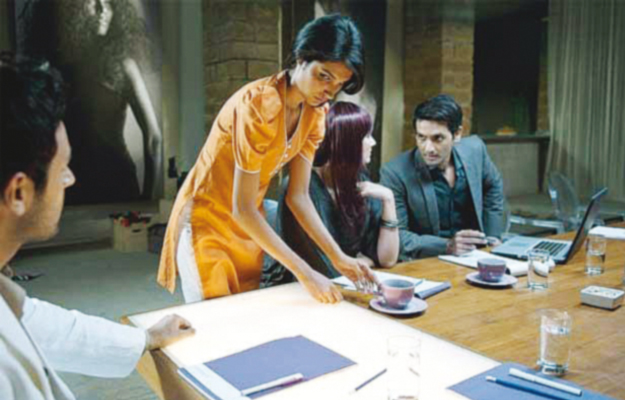Moldova and Saudi Arabia are among the first-time entrants, and Montenegro is submitting for the first time as an independent country.
The 86th Academy Awards nominations will be announced live on Thursday, Jan. 16, 2014, at 5:30 a.m. PST in the Academy’s Samuel Goldwyn Theater in Beverly Hills.
The submissions are:
Afghanistan, "Wajma – An Afghan Love Story," Barmak Akram, director
Albania, "Agon," Robert Budina, director
Argentina, "The German Doctor," Lucía Puenzo, director
Australia, "The Rocket," Kim Mordaunt, director
Austria, "The Wall," Julian Pölsler, director
Azerbaijan, "Steppe Man," Shamil Aliyev, director
Bangladesh, "Television," Mostofa Sarwar Farooki, director
Belgium, "The Broken Circle Breakdown," Felix van Groeningen, director
Bosnia and Herzegovina, "An Episode in the Life of an Iron Picker," Danis Tanovic, director
Brazil, "Neighboring Sounds," Kleber Mendonça Filho, director
Bulgaria, "The Color of the Chameleon," Emil Hristov, director
Cambodia, "The Missing Picture," Rithy Panh, director
Canada, "Gabrielle," Louise Archambault, director
Chad, "GriGris," Mahamat-Saleh Haroun, director
Chile, "Gloria," Sebastián Lelio, director
China, "Back to 1942," Feng Xiaogang, director
Colombia, "La Playa DC," Juan Andrés Arango, director
Croatia, "Halima’s Path," Arsen Anton Ostojic, director
Czech Republic, "The Don Juans," Jiri Menzel, director
Denmark, "The Hunt," Thomas Vinterberg, director
Dominican Republic, "Quien Manda?" Ronni Castillo, director
Ecuador, "The Porcelain Horse," Javier Andrade, director
Egypt, "Winter of Discontent," Ibrahim El Batout, director
Estonia, "Free Range," Veiko Ounpuu, director
Finland, "Disciple," Ulrika Bengts, director
France, "Renoir," Gilles Bourdos, director
Georgia, "In Bloom," Nana Ekvtimishvili and Simon Gross, directors
Germany, "Two Lives," Georg Maas, director
Greece, "Boy Eating the Bird’s Food," Ektoras Lygizos, director
Hong Kong, "The Grandmaster," Wong Kar-wai, director
Hungary, "The Notebook," Janos Szasz, director
Iceland, "Of Horses and Men," Benedikt Erlingsson, director
India, "The Good Road," Gyan Correa, director
Indonesia, "Sang Kiai," Rako Prijanto, director
Iran, "The Past," Asghar Farhadi, director
Israel, "Bethlehem," Yuval Adler, director
Italy, "The Great Beauty," Paolo Sorrentino, director
Japan, "The Great Passage," Ishii Yuya, director
Kazakhstan, "Shal," Yermek Tursunov, director
Latvia, "Mother, I Love You," Janis Nords, director
Lebanon, "Blind Intersections," Lara Saba, director
Lithuania, "Conversations on Serious Topics," Giedre Beinoriute, director
Luxembourg, "Blind Spot," Christophe Wagner, director
Mexico, "Heli," Amat Escalante, director
Moldova, "All God’s Children," Adrian Popovici, director
Montenegro, "Ace of Spades - Bad Destiny," Drasko Djurovic, director
Morocco, "Horses of God," Nabil Ayouch, director
Nepal, "Soongava: Dance of the Orchids," Subarna Thapa, director
Netherlands, "Borgman," Alex van Warmerdam, director
New Zealand, "White Lies," Dana Rotberg, director
Norway, "I Am Yours," Iram Haq, director
Pakistan, "Zinda Bhaag," Meenu Gaur and Farjad Nabi, directors
Palestine, "Omar," Hany Abu-Assad, director
Peru, "The Cleaner," Adrian Saba, director
Philippines, "Transit," Hannah Espia, director
Poland, "Walesa. Man of Hope," Andrzej Wajda, director
Portugal, "Lines of Wellington," Valeria Sarmiento, director
Romania, "Child’s Pose," Calin Peter Netzer, director
Russia, "Stalingrad," Fedor Bondarchuk, director
Saudi Arabia, "Wadjda," Haifaa Mansour, director
Serbia, "Circles," Srdan Golubovic, director
Singapore, "Ilo Ilo," Anthony Chen, director
Slovak Republic, "My Dog Killer," Mira Fornay, director
Slovenia, "Class Enemy," Rok Bicek, director
South Africa, "Four Corners," Ian Gabriel, director
South Korea, "Juvenile Offender," Kang Yi-kwan, director
Spain, "15 Years Plus a Day," Gracia Querejeta, director
Sweden, "Eat Sleep Die," Gabriela Pichler, director
Switzerland, "More than Honey," Markus Imhoof, director
Taiwan, "Soul," Chung Mong-Hong, director
Thailand, "Countdown," Nattawut Poonpiriya, director
Turkey, "The Butterfly’s Dream," Yilmaz Erdogan, director
Ukraine, "Paradjanov," Serge Avedikian and Olena Fetisova, directors
United Kingdom, "Metro Manila," Sean Ellis, director
Uruguay, "Anina," Alfredo Soderguit, director
Venezuela, "Breach in the Silence," Luis Alejandro Rodríguez and Andrés Eduardo Rodríguez, directors











.jpeg)






